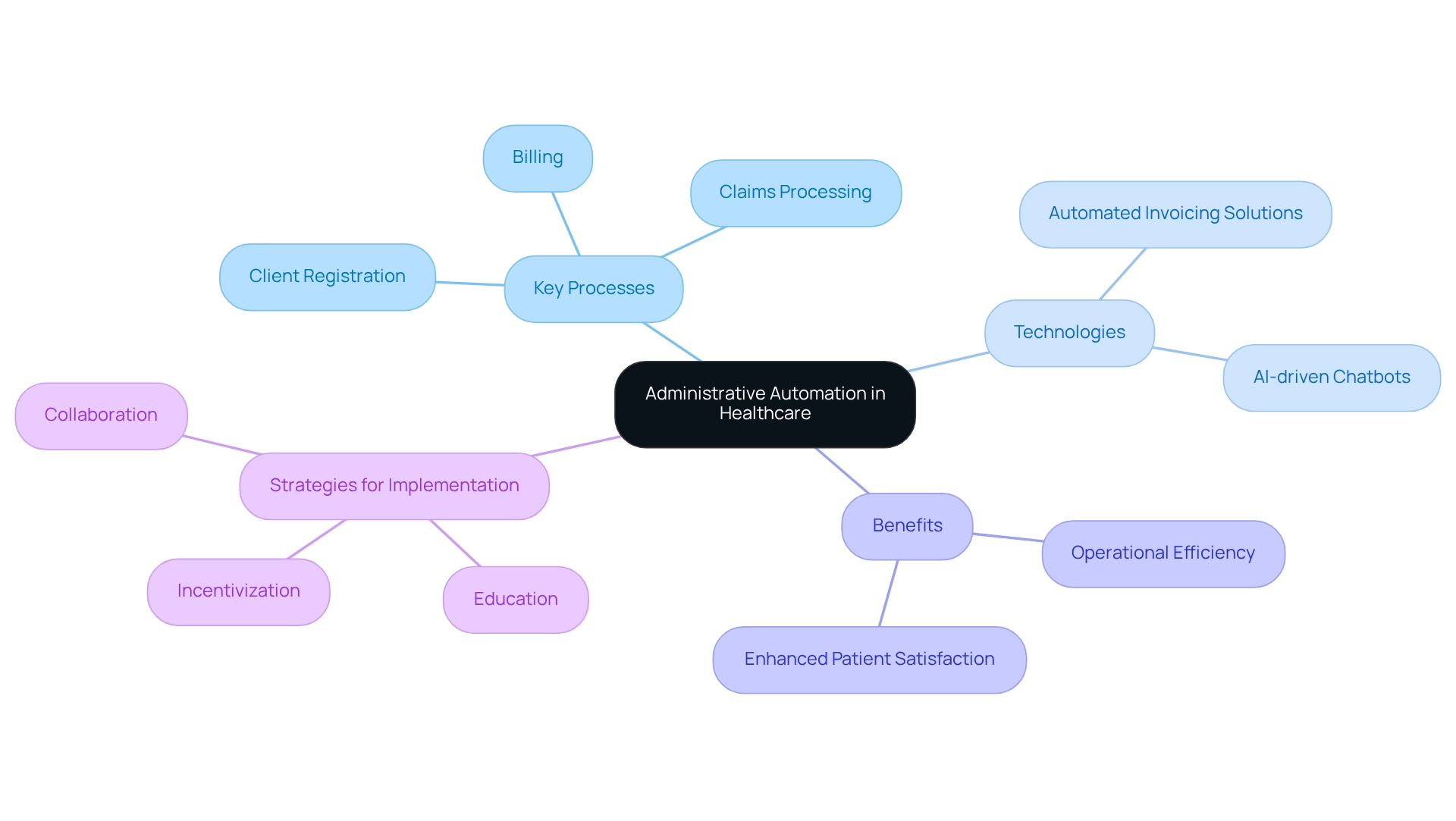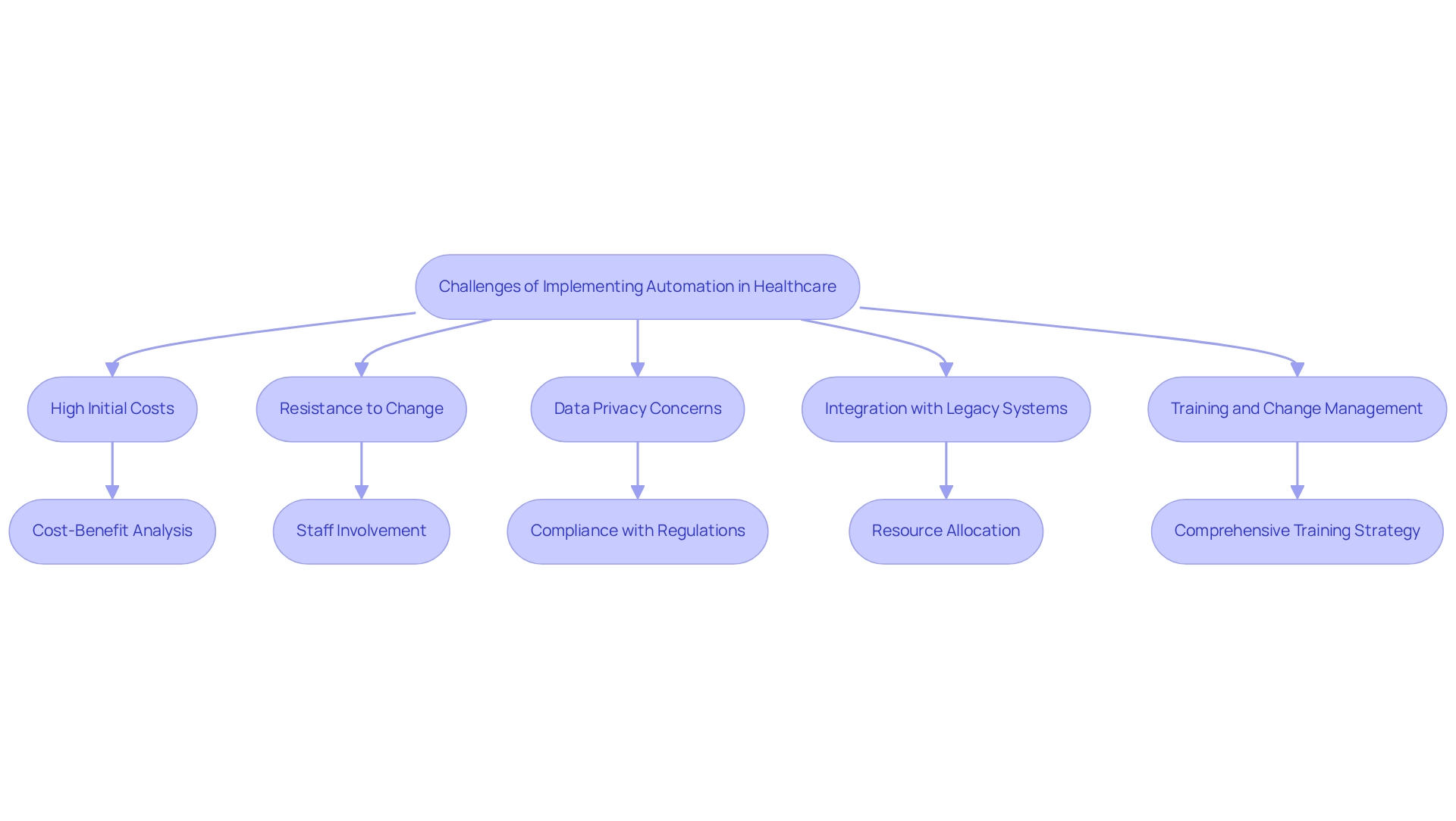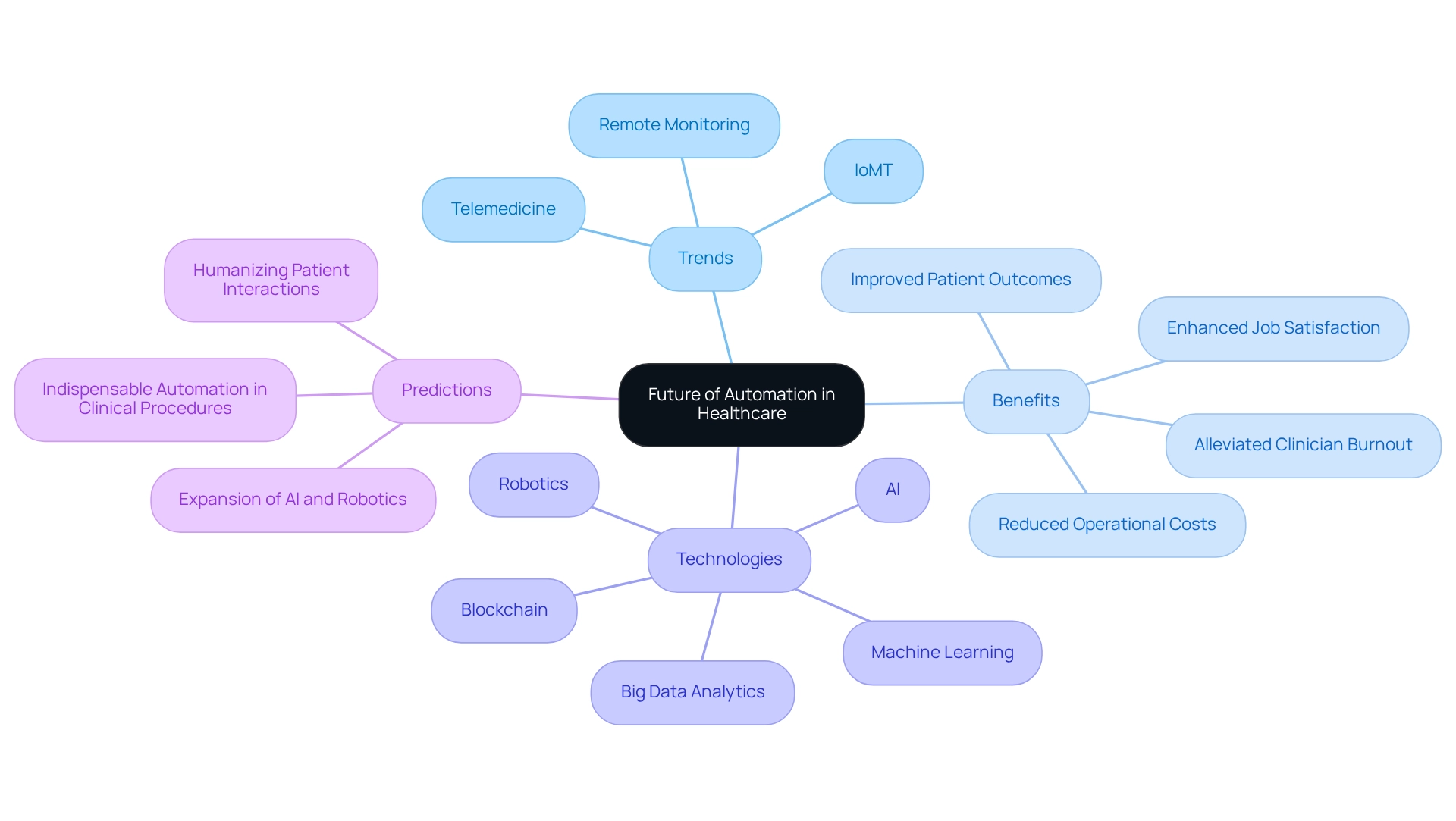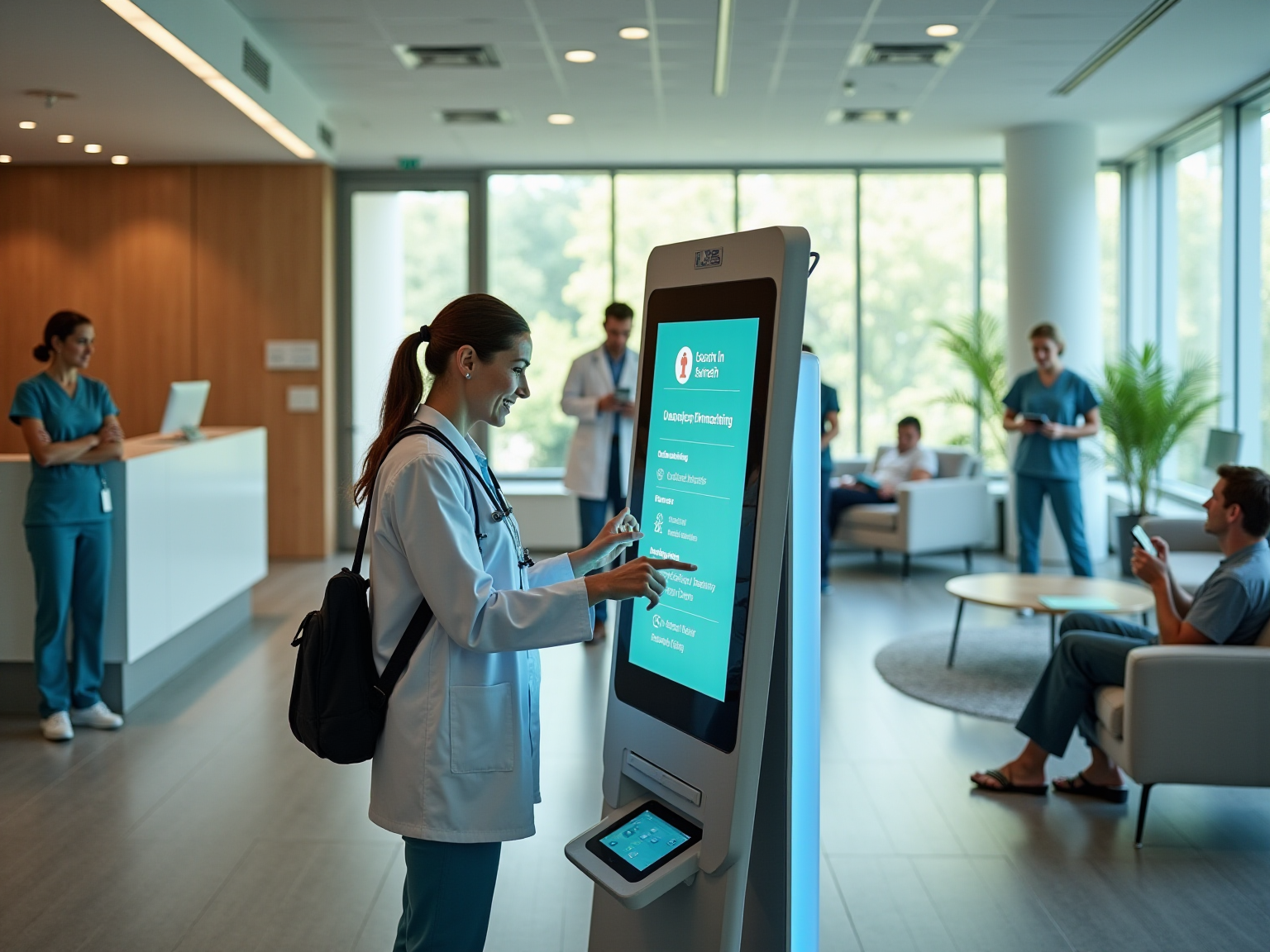Overview
Automation in the healthcare industry represents a pivotal shift, integrating technology such as artificial intelligence and robotic process management to execute tasks that have traditionally required human intervention. This transformation not only enhances operational efficiency but also significantly improves patient care.
How can healthcare providers afford to overlook such advancements? By reducing errors and streamlining processes—like appointment scheduling and electronic health records—automation plays a crucial role in elevating health outcomes. Furthermore, this integration leads to substantial cost savings for healthcare providers.
As a result, embracing automation is not just an option; it’s a necessity for those committed to delivering exceptional care.
Introduction
The healthcare landscape is on the brink of a transformative revolution, driven by the power of automation. As organizations increasingly embrace technology, the deployment of solutions like robotic process automation (RPA) and artificial intelligence (AI) is reshaping the way care is delivered. This shift not only enhances operational efficiency but also significantly improves patient outcomes, allowing healthcare providers to focus more on what truly matters—caring for patients.
But how can we ensure that this technology is effectively integrated into our systems? With the potential to reduce costs and streamline processes, automation is not just a trend; it is becoming a cornerstone of modern healthcare.
As advancements continue to unfold, understanding the implications and applications of automation will be crucial for navigating the future of healthcare delivery.
Are you ready to explore how these innovations can transform your practice?
Understanding Automation in Healthcare: An Overview
The automation in the healthcare industry encompasses the deployment of technology to execute tasks that traditionally required human involvement. This wide range of solutions includes robotic process management (RPA) and artificial intelligence (AI) systems, both aimed at enhancing operational efficiency, reducing errors, and improving outcomes for individuals. By alleviating the burden of manual tasks, automation enables providers to dedicate more time to patient care rather than administrative responsibilities, thereby transforming the provision of medical services.
As we look towards 2025, existing patterns in medical system improvements emphasize a notable shift towards incorporating AI technologies. For instance, AI-supported mammogram screenings have demonstrated a remarkable 20% increase in breast cancer detection rates, showcasing the potential of automation to enhance diagnostic accuracy. Additionally, the financial implications of adopting AI in medical services are significant; estimates suggest that widespread implementation could lead to a decrease of 5-10% in U.S. medical spending, translating to possible annual savings of up to $360 billion.
By 2026, AI applications are projected to reduce annual medical costs by $150 billion while simultaneously improving health outcomes and decreasing treatment expenses. This is where Avato’s Secure Hybrid Integration Platform plays a pivotal role, ensuring 24/7 uptime and reliability for complex systems in the medical field, helping businesses adapt to these changing demands and maintain a competitive edge in the sector.
The successful implementation of automation in the healthcare industry has also been noteworthy. Organizations that have adopted automation report streamlined operations and enhanced service delivery. As Gustavo Estrada, a customer, noted, “Avato simplifies complex projects and delivers results within desired time frames and budget constraints,” underscoring the effectiveness of automation in enhancing operational capabilities.
With Avato’s platform, medical providers can enhance the value of their existing frameworks, streamlining intricate integrations and significantly lowering expenses. Expert opinions indicate that by 2031, a substantial number of clinicians anticipate that clinical decisions will increasingly rely on AI, reflecting a growing confidence in technology’s role in improving care.
Furthermore, Avato’s Hybrid Integration Platform provides real-time tracking and notifications regarding performance, ensuring that medical providers can respond swiftly to any issues that arise. In conclusion, the incorporation of automation in the healthcare industry not only enhances operational processes but also profoundly influences patient care. By leveraging advanced technologies such as Avato’s Hybrid Integration Platform, medical providers can improve their service delivery, ultimately resulting in better health outcomes and a more efficient medical framework.
Get your copy now.
Key Technologies Driving Automation: AI and Machine Learning
Artificial Intelligence (AI) and Machine Learning (ML) are revolutionizing automation in the healthcare industry, enabling systems to analyze extensive datasets, uncover patterns, and enhance clinical decision-making. For instance, AI algorithms can diagnose diseases with remarkable precision by interpreting medical images and individual data more swiftly than human practitioners. This capability is crucial in a landscape where timely and precise diagnoses can significantly influence outcomes for individuals.
The integration of digital medicine, particularly through AI and virtual reality (VR), is transforming care by introducing innovative treatment methods that humanize healthcare. VR applications have demonstrated potential in pain management and PTSD treatment, enabling individuals to interact with immersive environments that can change their perception of pain and promote emotional healing. Such advancements emphasize the potential of technology to improve the experience of individuals while decreasing reliance on pharmaceuticals, which frequently carry side effects and risks of addiction.
As noted at the Interface Summit, these digital therapies can effectively ‘turn themselves off’ after a prescribed period, a feature not possible with traditional medications. Machine learning, a vital subset of AI, empowers systems to learn from data and refine their performance over time. This flexibility is particularly advantageous in fields like monitoring individuals and tailored treatment suggestions, where ongoing enhancement can result in improved medical service. In fact, the projected market value for AI applications in medical services is expected to reach $40 billion for robot-assisted surgery, $20 billion for virtual nursing assistants, and $345 million for medical chatbots by 2026, underscoring the growing reliance on these technologies.
Moreover, a broader perspective on AI’s impact can be seen in manufacturing, where businesses implementing AI perform 12% better than those relying on traditional methods. This statistic highlights the transformative potential of AI across various industries, including healthcare. Real-world examples illustrate the effectiveness of AI in clinical settings. Hospitals employing AI-driven tools have reported enhanced decision-making capabilities, leading to improved healthcare and operational efficiency.
A recent survey revealed that 87% of global organizations believe AI technologies will provide them with a competitive advantage, reflecting a significant shift in business strategies towards prioritizing AI. As Gustavo Estrada observed, Avato streamlines intricate projects, which is crucial in utilizing AI for efficient medical automation.
As we progress deeper into 2025, the influence of AI and ML on automation in the healthcare industry continues to grow, with essential technologies propelling improvements in care and clinical processes. Expert insights suggest that these innovations not only streamline operations but also improve the overall quality of care, making automation in the healthcare industry essential in contemporary medical practice. Moreover, the future of medical care relies on an open data strategy, where individuals have control over their health information, allowing them to investigate new treatment alternatives and improving the overall efficacy of digital medicine.
Applications of Automation in Healthcare: Enhancing Patient Care and Operations
The automation in the healthcare industry encompasses various applications that significantly enhance client care and operational efficiency. Automated appointment booking tools, for instance, have proven effective in reducing no-shows and improving visitor flow—critical elements for maintaining a seamless operational rhythm in medical facilities. By optimizing the scheduling process, these solutions not only improve access to care but also empower providers to allocate resources more efficiently.
Electronic health record (EHR) platforms exemplify the transformative impact of automation. By automating data entry and retrieval, EHRs guarantee that healthcare providers have immediate access to vital client information, essential for informed decision-making. Furthermore, the integration of decision support systems within EHRs has been shown to substantially decrease medication errors, with studies indicating a relative risk reduction of 0.60 for medication errors when EHRs are utilized alongside decision support.
As KC Arnold, a Nurse Practitioner at the Diabetes Center, PLLC, remarked, “I have so many patients tell me, ‘Thank you, EHRs help me with diabetes management.’”
Moreover, the implementation of digital tools, such as patient portals, has been highlighted in case studies like that of Dr. Leann Legg from Dover Family Physicians. Her practice’s adoption of a patient portal not only improved the quality of care but also bolstered preventive care strategies, showcasing the effectiveness of technology in enhancing patient engagement and health outcomes. This aligns with the broader theme of automation, underscoring the need for reliable, future-ready technology stacks, such as those provided by Avato, to adapt to the evolving demands of the medical field.
Avato’s hybrid integration platform and commitment to developing technology solutions are crucial for enhancing integration strategies, ensuring that medical providers can engage stakeholders effectively, model new business processes, and secure their infrastructures for the future. Robotic systems are also advancing in surgical settings, offering enhanced precision and potentially shortening recovery times for patients. These advancements illustrate how mechanization can lead to improved overall outcomes by elevating both the quality of care and the efficiency of medical operations.
As we approach 2025, the current applications of mechanization in medical services continue to evolve, with an increasing emphasis on integrating advanced technologies to meet the needs of modern medical environments. Expert opinions stress the importance of promoting effective EHR implementation strategies to elevate the quality of medical care, highlighting the ongoing necessity for research into EHR software features and their influence on clinical outcomes. The benefits of automation in the healthcare industry, including automated appointment scheduling and electronic health record platforms, are clear, establishing these processes as fundamental components of contemporary medical service provision.
Administrative Automation: Streamlining Healthcare Management
Administrative automation is pivotal in streamlining essential tasks such as billing, claims processing, and client registration. By adopting automated invoicing solutions, medical organizations can significantly reduce the time and resources typically assigned to manual documentation. For instance, these systems enable prompt invoicing and payment processing, which is essential for sustaining cash flow and operational stability.
Furthermore, the incorporation of AI-driven chatbots enhances client interactions by effectively handling inquiries and appointment scheduling. This not only improves operational effectiveness but also greatly increases satisfaction levels by offering quicker responses and minimizing wait times.
Statistics reveal that as of December 2023, only 25% of medical executives had embraced generative AI solutions, indicating a substantial opportunity for automation in the healthcare industry to enhance efficiency. This statistic underscores the urgency for medical organizations to adopt automation, particularly as the next few years are crucial for harnessing AI’s transformative potential in administrative functions.
The advantages of automation in healthcare extend beyond mere efficiency improvements. By alleviating administrative burdens, medical providers can focus more on patient care, ultimately resulting in enhanced health outcomes. Case studies have shown that organizations adopting automated billing solutions experience improved operational efficiency, enabling them to allocate resources more effectively.
Avato’s Secure Hybrid Integration Platform is essential in this transformation, guaranteeing round-the-clock uptime and reliability for complex infrastructures in the medical field. It optimizes the value of legacy infrastructures, streamlines intricate integrations, and significantly reduces expenses, making it a vital tool for medical organizations aiming to enhance their operational capabilities. Moreover, the platform provides live tracking and notifications regarding system performance, thereby bolstering operational integrity.
Expert opinions emphasize the importance of implementing automated strategies as part of healthcare automation for effective medical management. The ONC has outlined six strategies to facilitate workflow optimization, highlighting the significance of education, collaboration, and incentivization to foster a supportive environment for such systems. These strategies aim to involve all participants, including individuals receiving care and their supporters, in the process of improving medical service delivery.
As Gustavo Estrada noted, Avato is recognized for its ability to streamline complex projects and achieve outcomes within specified timelines and budgets, demonstrating the practical validation of automated solutions. Additionally, Avato’s strategic alliance with Red Hat enhances its hybrid integration capabilities through enterprise open-source solutions, further aiding medical organizations in their streamlining efforts. In summary, the impact of automation in the healthcare industry, particularly through automated billing systems, is profound, driving improvements in both operational efficiency and patient satisfaction.
As the sector continues to evolve, adopting administrative technology will be crucial for medical providers seeking to thrive in a competitive environment.

Challenges of Implementing Automation in Healthcare
Introducing automation in the healthcare industry presents numerous benefits; however, it also poses significant obstacles. High initial costs often deter organizations from adopting new technologies, as they must consider the upfront investment against potential long-term savings. Additionally, resistance to change from personnel is a considerable challenge; many workers may feel threatened by mechanization, fearing job loss or a shift in their responsibilities.
This sentiment is echoed in various studies, where a substantial percentage of medical professionals express concerns about the implications of automation on their work environment. Notably, a study among radiology residents revealed that 86% agreed that AI would change and improve their practice, indicating a potential shift in perception that could help mitigate resistance.
Data privacy and security concerns are paramount in the healthcare sector, where sensitive patient information is at stake. Organizations must navigate complex regulations and ensure that automated processes adhere to stringent data protection standards.
The integration of new automated technologies with existing legacy infrastructures can be a daunting task, often requiring significant time and resources to achieve seamless functionality. A transparent data future, where individuals have control over their health information, is vital for unlocking the full potential of these technologies.
Preparing personnel to work efficiently with automation is essential, yet it necessitates a substantial investment in training and change management approaches. A comprehensive training strategy can reduce resistance and enhance the overall effectiveness of system initiatives. The advancements in digital medicine, particularly through AI and VR, present promising avenues for personalizing patient care, as evidenced by virtual reality therapies that alleviate pain perception and enhance treatment experiences.
Statistics indicate that 80% of Americans are willing to utilize AI-driven tools for health management, reflecting a growing acceptance of technology in medical services. However, substantial challenges persist. For example, a case study on the implementation of automation through an Automated Medication System (AMS) showcased the complexities involved, revealing that while the AMS significantly reduced medication errors, the transition process was fraught with difficulties, including staff pushback and integration issues.
This underscores the necessity for meticulous planning and implementation in technology projects, especially when utilizing platforms such as Avato’s hybrid integration, which leverages Red Hat’s open-source solutions to enhance enterprise integration.
Expert opinions suggest that addressing these challenges in healthcare automation requires strategic planning and a focus on fostering a culture of innovation within organizations. By actively involving staff in the mechanization process and providing clear communication about the benefits, organizations can overcome resistance and pave the way for successful implementation. Furthermore, AI-driven diagnosis and treatment models have demonstrated substantial cost reductions compared to traditional methods over the past decade, highlighting the economic advantages of embracing technology.
Ultimately, the journey toward mechanization in medical services is complex, but with the right strategies, it can lead to improved care management and refined clinical procedures.

The Future of Automation in Healthcare: Trends and Predictions
The prospects of mechanization in medical services are on the verge of significant advancement, primarily fueled by continuous innovations in automation within the healthcare sector, including AI, machine learning, and robotics. Key trends such as telemedicine and remote monitoring are expected to gain momentum, fundamentally transforming the delivery of medical services. The integration of automation with Internet of Medical Things (IoMT) devices will further enhance real-time monitoring and data collection, facilitating more responsive and personalized care.
As medical organizations increasingly embrace these technologies, a range of benefits is anticipated, including improved patient outcomes and reduced operational costs. For instance, AI solutions designed to alleviate clinicians’ administrative burdens are projected to mitigate burnout and enhance job satisfaction, fostering a more efficient workforce. Additionally, effective systems for big data storage, processing, and analytics will be vital for achieving the goals of medical analytics, ultimately refining treatment planning and pricing for accountable care organizations.
Looking ahead to 2025, forecasts indicate that the role of AI and robotics in medical services will expand, with automation becoming indispensable in clinical procedures and care management. The advancements in digital medicine, particularly through AI and VR applications, are revolutionizing patient care by humanizing interactions and improving data accessibility. Case studies, such as the survey on Sensor-IoT-AI-Blockchain-based health management systems, underscore successful implementations and critical challenges in medical integration, demonstrating their potential to streamline operations.
As Gustavo Estrada noted, “Avato has streamlined intricate projects and provided outcomes within preferred timelines and financial limits,” emphasizing the efficiency of mechanization in the medical field. Furthermore, with 189 articles selected after a thorough review, the evidence substantiates the claims regarding advancements and trends in automation within the healthcare industry. Expert insights suggest that as these technologies evolve, they will not only enhance operational capabilities but also empower providers to adapt to the ever-changing demands of the industry, preserving a competitive edge in delivering quality care.
Moreover, the significance of data ownership and access is paramount in this digital transformation narrative. Empowering individuals with control over their health information is essential for exploring new treatment options and enhancing the overall efficiency of medical delivery. Avato’s Hybrid Integration Platform is instrumental in facilitating this access, ensuring that organizations in the medical field can implement the critical steps necessary for successful digital transformation.

Benefits of Automation in Healthcare: Improving Efficiency and Outcomes
The automation in the healthcare industry presents a multitude of advantages that significantly enhance operational efficiency and patient care. Streamlining processes allows medical organizations to realize substantial cost reductions, with studies indicating that automation can lower operational expenses by as much as 30%. This reduction is accomplished by minimizing manual errors and optimizing resource allocation—an essential factor in a sector where precision is critical.
For example, automated solutions for managing patient records not only guarantee accuracy and accessibility but also enable quicker information retrieval, thereby improving clinical workflows. Avato’s hybrid integration platform is pivotal in this transformation, facilitating secure system integration across banking, medical, and government sectors. By offering a connected foundation, Avato simplifies complex integrations, allowing providers to focus on delivering quality care.
As Tony LeBlanc from the Provincial Health Services Authority remarked, “Good team. Good people to work with. Extremely professional. Extremely knowledgeable.” This testimonial highlights the effectiveness of Avato’s solutions in fostering collaboration and expertise in healthcare integration.
AI-driven diagnostic tools further illustrate this trend, enhancing the speed and accuracy of medical assessments, which leads to timely interventions that can save lives. The integration of digital medicine, including AI and VR technologies, is also vital in humanizing care for individuals. For instance, virtual reality applications have shown promise in addressing conditions such as PTSD, providing immersive experiences that can alleviate pain and anxiety, thus improving overall outcomes.
The impact of automation in the healthcare industry extends beyond cost reductions; it also significantly improves health outcomes. Practical examples indicate that hospitals employing automated scheduling methods have seen a notable increase in satisfaction ratings. Indeed, during the mid-pandemic phase, the responsiveness of hospital personnel—a crucial aspect of patient experience—dropped by 3.7 points, underscoring the urgent need for more effective frameworks that can adapt to changing demands.
Moreover, expert opinions underscore the importance of automation in enhancing client satisfaction. Dr. Jonathan Teich, a practicing physician and informaticist, asserts that the successful implementation of automated systems necessitates a profound understanding of existing workflows, akin to the knowledge possessed by long-serving staff members. This insight is crucial for developing algorithms that authentically capture the nuances of patient care.
Furthermore, the case study of CallMiner’s Conversation Intelligence illustrates how technology can elevate customer experience across various industries, including medical services. By analyzing omnichannel interactions, CallMiner enables organizations to identify enhancement opportunities, ultimately fostering growth and improving satisfaction.
In summary, the primary benefits of automation in the healthcare industry encompass improved efficiency, enhanced patient outcomes, and significant cost reductions. However, future research should concentrate on the internal environment and individual characteristics to better comprehend implementation barriers. As the industry evolves in 2025 and beyond, the integration of automation in healthcare, bolstered by platforms like Avato, will be crucial for healthcare organizations striving to maintain a competitive edge while delivering high-quality care.
Conclusion
The integration of automation in healthcare signifies a pivotal transition towards more efficient and effective care delivery. By employing technologies such as robotic process automation (RPA) and artificial intelligence (AI), healthcare organizations streamline operations and enhance patient outcomes. Evidence indicates that automation can yield substantial cost savings, minimize errors, and elevate patient satisfaction, ultimately enabling providers to concentrate on what truly matters—caring for patients.
As advancements in automation progress, the future of healthcare appears increasingly promising. The incorporation of AI and machine learning is set to revolutionize clinical decision-making, while innovative applications in telemedicine and remote monitoring will further personalize patient care. However, addressing the challenges linked to implementing these technologies—such as costs, staff resistance, and data security concerns—is essential. By fostering a culture of innovation and collaboration, healthcare organizations can surmount these obstacles and harness the full potential of automation.
In conclusion, the journey towards automation in healthcare is fraught with complexities, yet the rewards are substantial. As organizations leverage platforms like Avato’s Hybrid Integration Platform, they can facilitate a smoother transition into this new era of healthcare delivery. Embracing automation is not merely a trend; it is a necessary evolution that will redefine patient care, rendering healthcare more efficient, accessible, and focused on enhancing outcomes for all.

